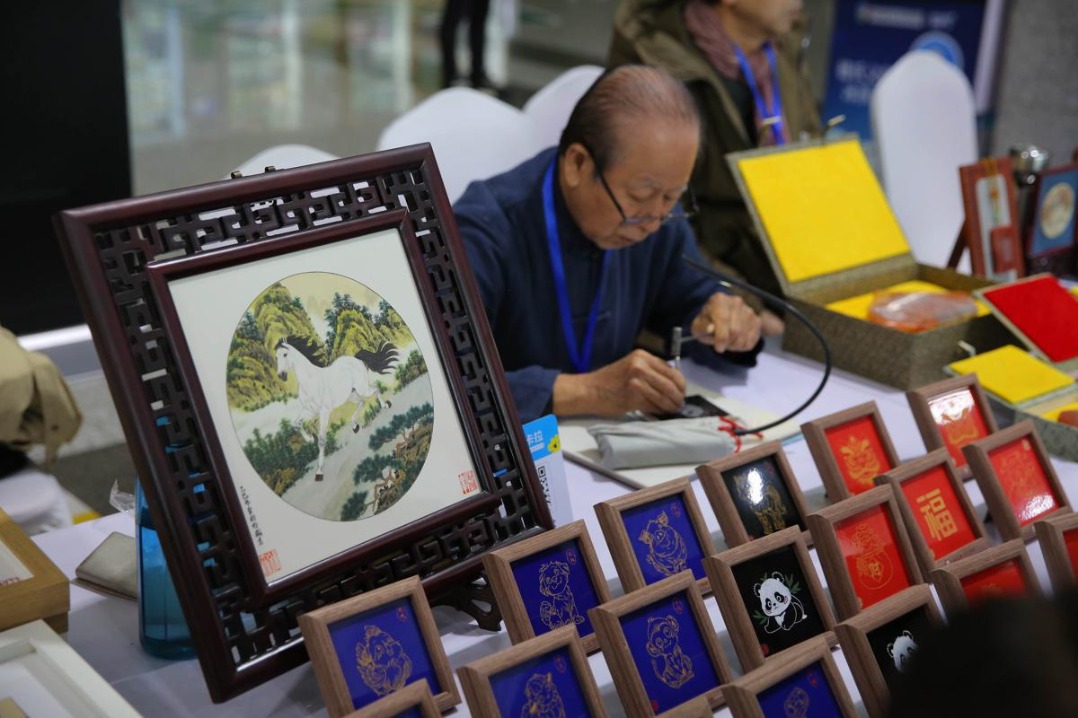Jiangxi rural mother denied education ensures daughters don't miss out

NANCHANG-Deep in the mountains in the midst of the rice paddies of Chongyi county in Jiangxi province, 35-year-old Deng Dinglan is busy preparing schoolbags, stationery and the like for her four 12-year-old daughters, who are about to start sixth grade.
The Shangbao rice terraces, which lie behind the family home, have been cultivated for thousands of years. In 2018, the UN's Food and Agriculture Organization recognized the terraces as a globally important agricultural heritage site.
Four girls from one family going to school at the same time would once have been impossible for villagers here, and Deng herself only received primary school education. Her family was so poor when she was a child that they could only afford to educate her younger brother, while Deng and her younger sister were forced to drop out of school to work in the fields until they could find jobs in the neighboring Guangdong province.
When they were old enough to marry, the sisters returned to the mountains to have families of their own.
According to Deng, grinding poverty often meant that local women had to assume responsibility for their families at an early age, a fate passed down from generation to generation.
Twelve years ago, she gave birth to four girls instead of the boy her family was expecting. They were born nearly 40 days early, each weighed just 1.48 kg, and had to be kept in incubators.
According to statistics, the odds of multiple identical births happening as a result of natural conception are about one in 15 million, and are even lower for babies of the same sex.
For Deng, who made less than 2,300 yuan ($334) a year at the time, the arrival of quadruplets was both a big surprise and a financial burden.
She and her husband eked out a living working in the fields and harvests from the family's 0.2 hectares of paddy fields gave them just enough to eat. During the offseason, the couple were forced to supplement their incomes by working in toy and clothing factories in Guangdong. "The baby formula alone cost nearly 1,000 yuan a month," said Deng, adding that when one child got sick, the other three were likely to be affected, and a hospital visit could cost more than 4,000 yuan.
Not long after their quadruplets were born, China implemented targeted poverty alleviation policies. Deng's family was registered as a poverty-stricken household. Her husband, Wu Nianyou, was hired by the local government as a forest ranger and Deng as a housekeeper, helping raise the family's annual income sharply by nearly 10,000 yuan.
Deng was concerned with her daughters' education, which she saw as the best way for them to escape the remote mountains.
She did not buy them toys until they were six, but she made a habit of taking a family photo every two years. The six taken in the past 12 years clearly record the four girls' educational progress.
The third family photo, taken in 2016, shows the girls dressed in pink, smiling in front of their kindergarten. During China's fight against absolute poverty, the local government subsidized students from registered poor families up until graduation, and the girls were among those who benefited from the policy.
The fifth family photo, taken in 2020, shows the quadruplets returning home with their pink schoolbags. Because they look alike, teachers and classmates still often mix their names up but Deng is able to accurately identify her daughters by voice.
Last year, after the family was able to lift themselves out of poverty, Deng hung the family's certificate of poverty alleviation on the wall next to the awards her children had received at school. She also built a new house with the help of the local government, with separate rooms and desks for each daughter.
Official data shows that the net enrollment rate for primary school-age girls has remained at a minimum of 99.9 percent for six consecutive years since 2015, and China's compulsory education gender gap has effectively been eliminated.
"Their lives are definitely different from mine. I'm sure they will study further and go to college," Deng said. "As long as they study hard, they'll get a higher education."
Xinhua
- Xinjiang reports highest foreign trade growth in China
- Harbin authorities demand return of pensions paid out to deceased
- Global research project on AI guardrails launched in Beijing
- Partnering with China, embracing opportunities
- China's cyberspace regulators announce measures for protection of minors
- Beijing's 'Rocket Street' promoted at aerospace conference



































